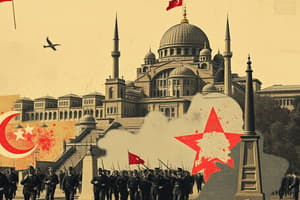Podcast
Questions and Answers
Which group was primarily responsible for overseeing religious and educational duties?
Which group was primarily responsible for overseeing religious and educational duties?
- Peasants
- Clergy (correct)
- Nobles
- Burghers
What was a primary characteristic of the noble class?
What was a primary characteristic of the noble class?
- They lived in towns.
- They governed lands but were not supposed to work. (correct)
- They led military campaigns regularly.
- They worked in agriculture.
Which social group made up approximately 85% of the population around 1500?
Which social group made up approximately 85% of the population around 1500?
- Clergy
- Peasants (correct)
- Nobles
- Burghers
What role did burghers play in society?
What role did burghers play in society?
What system did the Ottoman Empire utilize to manage religious communities?
What system did the Ottoman Empire utilize to manage religious communities?
What was the public perception of beggars from outside their local community?
What was the public perception of beggars from outside their local community?
What was one major result of the collapse of authority after the Roman Empire?
What was one major result of the collapse of authority after the Roman Empire?
In the feudal system, how was society primarily structured?
In the feudal system, how was society primarily structured?
Flashcards
Who were the clergy?
Who were the clergy?
The clergy were religious officials who performed religious duties and provided spiritual guidance to the community. They served as priests, teachers, judges, nurses, landlords, and chaplains.
Who were the nobles?
Who were the nobles?
The nobles were the ruling class in medieval society. They owned land, governed their territories, and were expected to defend the king and their families. They were considered superior by birth.
Who were the peasants?
Who were the peasants?
Peasants were the largest group in medieval society. They worked the land and provided food for the nobles and clergy. They lived in villages and depended on the protection of the nobles in exchange for their labor.
Who were the burghers?
Who were the burghers?
Signup and view all the flashcards
What is feudalism?
What is feudalism?
Signup and view all the flashcards
What was the Ottoman Empire's approach to religious communities?
What was the Ottoman Empire's approach to religious communities?
Signup and view all the flashcards
How did the Roman Catholic Church in Europe view Islam?
How did the Roman Catholic Church in Europe view Islam?
Signup and view all the flashcards
What was the life of a peasant like?
What was the life of a peasant like?
Signup and view all the flashcards
Study Notes
Ottoman Empire
- Multi-ethnic and multilingual
- Evolved into a formal state council (divan)
- Soldiers, religious clergy, and officials
- Strong navy
- Effective diplomacy
- Used loyal elites for funding
- Collected taxes from non-Muslims
- Tolerant of various religious groups
Western Europe
- Not as tolerant as the Ottoman Empire
- Expelled Jews and Muslims
- Viewed Muslims/Jews as a threat
- Practiced Christianity (RCC)
- Ottoman Empire was a threat to Western Europe economically
Society Structure
- Clergy, nobles, peasants, and burghers
- Clergy prayed and cared for souls
- Local rather than regional/national outlook
- Served as priests, teachers, judges, nurses, landlords, and chaplains
- 20% of European population
Feudalism
- Reaction to anarchy
- King, lords, vassals, and peasants
- Peasants worked on lords' land for protection
- Limited legal rights unless owned land
- Violence was normal
- Breakdown of law and order (980-1030)
- Clans, territorial lords, predatory bands
- Villages/towns/parishes formed defenses
Church Courts
- Ecclesiastical courts (ecclesiastic)
- Included orders like Benedictine, Franciscan, and Dominican
- Priests/monks generally poor
- Bishops from wealthy families
Beggars
- 7 lots of beggars in towns
- Wandered seeking help
- Viewed with suspicion, especially gypsies (Roma)
- Western European charity, encouraged by RCC
Studying That Suits You
Use AI to generate personalized quizzes and flashcards to suit your learning preferences.
Related Documents
Description
Explore the intricate relationships between the Ottoman Empire and Western Europe during the Middle Ages. This quiz delves into social structures, feudalism, and the contrasting tolerances within these regions. Test your knowledge on the major themes and dynamics that defined this historical period.




